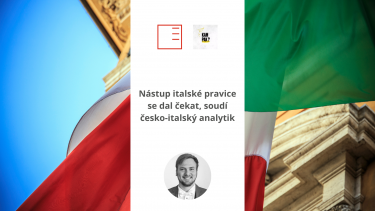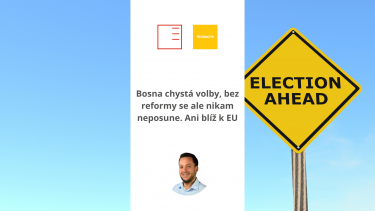RTVS: Slovenia will have a new president. What decided the victory of Natasha Pirc Musar?
Nataša Pirc Musar won Sunday's second round of the presidential election, receiving 54% of the votes. She defeated her rival, former Foreign Minister Andrej Logar. Musar will replace current president Borut Pahor, who has been unable to run for two terms. Our analyst Žiga Faktor, head of the Brussels office, also commented on the situation.
Show more
Blog | A drop of leftwing in a sea of rightwing? The Brazilian elections
As the world eagerly awaits the outcomes of Brazilian elections, which will have strong impacts on the future of the Amazon and global climate efforts, our intern, Benedetta Milani, breaks down the status quo as Brazil determines its political future tomorrow.
Show more PDFKam pak?: The rise of the Italian right was to be expected, says Czech-Italian analyst
Who is Giorgia Meloni? How much does she claim the legacy of Benito Mussolini? What will her government look like and what can it mean for Italy? For the podcast "Kam pak?" on the topic of Italy's incoming new government, commented our researcher and Italy expert, Alexandre Lagazzi.
Show more
EU± Italian elections - tragedy or promise for the future?
We would like to invite you to a debate in the EU± series, this time on the topic "The Italian elections - a tragedy or a promise for the future?" The debate will take place on 11 October 2022, 16:00 - 17:15 via Facebook Live.
Show moreE15: The new Italian government must continue with reforms. Support for Ukraine in Rome will probably recede
One of our research associate, Alexandr Lagazzi, commented on the upcoming Italian elections for E15. According to pre-election polls, it can be assumed that the right-wing coalition led by Giorgia Meloni will win the elections. However, according to experts, this result could represent a significant risk for the Italian economy, the drawing of contributions from the EU and the supply of weapons to Ukraine.
Show more
RTV: Early Italian elections. Government crisis on the Apennine Peninsula.
Alexandr Lagazzi, an associate research fellow at our Institute, commented for Slovak RTV on the government crisis in Italy, which is leading to early elections. These are likely to take place at the end of September.
Show more
EURACTIV: Bosnia prepares for elections, but will go nowhere without reform. Not even closer to the EU
The head of the Brussels office Žiga Faktor commented for EURACTIV. What are the chances of reforming the electoral system in Bosnia? How should parties work on it and what should it include? According to Žiga Faktor, it must not only reflect political proposals and ambitions, but it is necessary to think about what citizens themselves want and how the reform will affect them.
Show more
iROZHLAS.cz: Draghi, the 'stabiliser of Italian politics', at a crossroads. He must resolve government disagreements or call early elections
Italy is facing a government crisis. Prime Minister Draghi has announced his resignation, but the president has not accepted the resignation. Alexandr Lagazzi, our associate research fellow, commented for iRozhlas.cz on the current political situation in Italy and the related resignation of Draghi.
Show more
EURACTIV: Reform of European elections or the whole EU. Czech Presidency opens sensitive topics in Prague
The Czech Republic, in its role as the presiding country, will have to deal with the European Parliament's proposal to launch the so-called Convention - the process of treaty change. Minister Bek announced that he would send a questionnaire to his European colleagues to find out which proposals could be implemented with or without changing the Treaties. Our researcher Zuzana Stuchlíková commented on the questionnaire initiative for Euractiv.
Show more
Stošestka: How does the victory of Vučić and Orbán threaten the values of the rule of law?
Jana Juzová, EUROPEUM Research Fellow, participated in the new episode of Transparency International's Stošestka podcast. From Brussels, she explained how the elections in Serbia, Hungary, Slovenia, and France decided the political future of Europe.
Show moreStaroměstské náměstí 4/1
Prague 1 - Staré Město
110 00
tel.: +420 212 246 552
email: europeum@europeum.org
https://www.europeum.org









